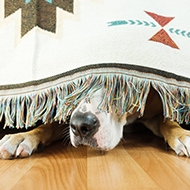Fireworks and loud noises top list of dogs’ biggest fears

Guide Dogs has put together advice for pet owners ahead of Bonfire Night.
More than a quarter of pet owners say their dog’s biggest fears are fireworks and loud noises, according to new research.
More than 32,000 people were surveyed in the Guide Dogs’ Great British Dogs Survey. Of these, 8,473 people said their dogs were more scared of fireworks than being left alone or going to the vet.
In light of its findings, Guide Dogs has put together advice for pet owners ahead of Bonfire Night, which includes looking out for the warning signs of stress, getting dogs used to the noise and making dogs relaxed on the day.
Guide Dogs volunteer Sophie Vann, uffered her own negative fireworks experience last year while walking her one-year-old guide dog puppy, Vixen.
Sophie said: “I was out for a walk with my partner when a firework was thrown into an underpass we were heading through. The noise scared the life out of us, especially Vixen. She wasn’t herself for a few months after.”
Sophie explained that it took about three months of careful training to get Vixen used to loud noises again and that she was already thinking about this year’s fireworks back in July.
“It’s all about building layers of confidence. Since the incident, I prepare for fireworks season early and start by playing a fireworks playlist on my computer in the weeks and months leading up to it,” she said. “Gradually I increase the volume, but I’m careful to ensure this is done gently to avoid making Vixen feel anxious.
“As for Bonfire Night itself, I’ll make sure she gets fed earlier, so that she can go out in the garden before the fireworks start. I’ll also move her bed away from the backdoor so that she can’t see the flashes. Vixen is going to be a guide dog mum in the future so I have to make sure she’s as comfortable as possible.”



 The latest
The latest